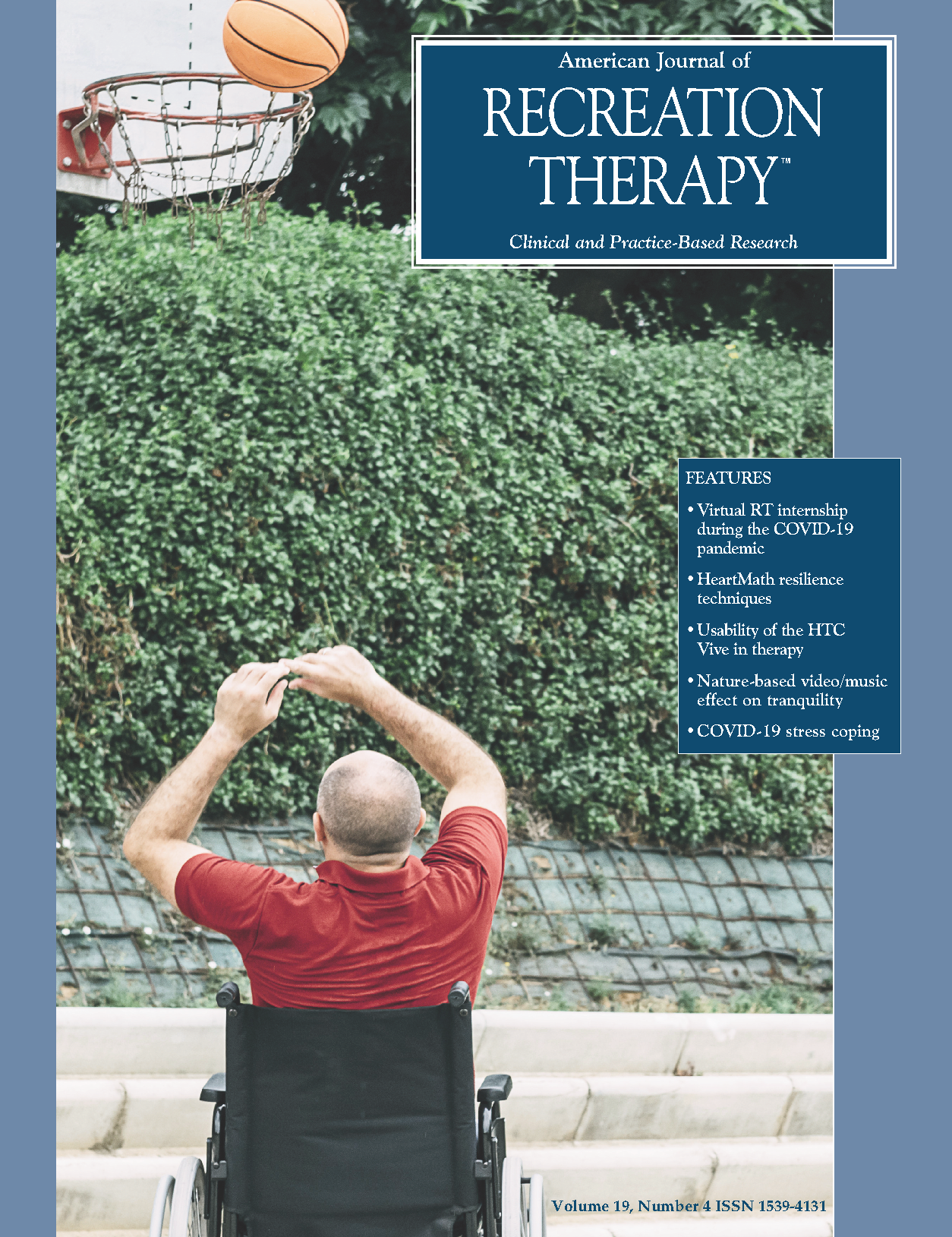Nature-based video and classical music’s effects on tranquility among memory care residents with dementia
DOI:
https://doi.org/10.5055/ajrt.2020.0225Keywords:
dementia, nature, music, indoor ecotherapy, tranquility, recreational therapy, healthcare management, long-term careAbstract
This case study reports the effects of viewing nature photographs with classical music on participants’ tranquility levels among 10 memory care residents living with dementia. This study utilized a pre-/post-design with residents’ rating their tranquility level and a certified Nurse Aid observer rating each resident’s perceived tranquility level both before and after the video intervention using a Tranquility Scale. Statistical analyses suggested that residents’ tranquility levels from both residents’ and staff’s perspectives showed significant improvement after the intervention compared to their baseline. These findings are discussed in relation to the literature on nature-based and music therapies. We also offer practical implications for recreational therapists and memory care workers.
References
Cohen MJ: Agitated behaviors in the elderly: II. Preliminary results in the cognitively deteriorated. J Am Geriatr Soc. 1986; 34(10): 722-727.
World Health Organization: 10 Facts on Dementia. Geneva: World Health Organization, 2017.
Chung J, Choi S, Kim J: Experience of media presentations for the alleviation of agitation and emotional distress among dementia patients in a long-term nursing facility. Dementia. 2016; 15(5): 1021-1189.
American Psychiatric Association: The American Psychiatric Association Practice Guideline on the Use of Antipsychotics to Treat Agitation or Psychosis in Patients with Dementia. Washington, DC: American Psychiatric Association Publishing, 2016.
Azermai M, Petrovic M, Elseviers MM, et al.: Systemic appraisal of dementia guidelines for the management of behavioral and psychological symptoms. Ageing Res Rev. 2012; 11(1): 78-86.
Clinebell H: Ecotherapy: Healing Ourselves, Healing Earth. Minneapolis, MN: Fortress, 1996.
Nadkarni NM, Hasbach PH, Thys T, et al.: Impacts of nature imagery on people in severely nature-deprived environments. Front Ecol Environ. 2017; 15(7): 395-403.
Keniger LE, Gaston KJ, Irvine KN, et al.: What are the benefits of interacting with nature? Int J Environ Res Publ Health. 2013; 10(3): 913-935.
Watts C, Hsieh P: The use of horticulture-based programs to promote engagement for older adults with dementia. Ther Recreat J. 2015; 49(3): 257-260.
Ulrich RS: View through a window may influence recovery from surgery. Science. 1984; 224(4647): 420-421.
Kahn PH: Technological Nature: Adaptation and the Future of Human Life. Cambridge, MA: The MIT, 2011.
Tennessen CM, Cimprich B: Views to nature: Effect on attention. J Environ Psy. 1995; 15(1): 77-85.
van den Berg M, Maas J, Muller R, et al.: Autonomic nervous system responses to viewing green built settings: Differentiating between sympathetic and parasympathetic activity. Int J Environ Res Publ Health. 2015; 12: 15860-15874.
Kahn PH, Severson RL, Ruckert JH: The human relation with nature and technological nature. Curr Dir Psychol Sci. 2009; 18(1): 37-42.
Koger SM, Chapin K, Brotons M: Is music therapy an effective intervention for dementia?: A meta-analytic review of literature. J Music Ther. 1999; 36(1): 2-15.
Wall M, Duffy A: The effects of music therapy for older people with dementia. Br J Nurs. 2010; 19(2): 108-113.
Baker F, Uhlig S, Austin DS, et al.: Voicework in Music Therapy: Research and Practice. London, UK: Jessica Kingsley, 2011.
Labbé E, Schmidt N, Babin J, et al.: Coping with stress: The effectiveness of different types of music. Appl Psychophysiol Biofeedback. 2007; 32: 163-168.
Suda M, Morimoto K, Obata A, et al.: Emotional responses to music: Towards scientific perspectives on music therapy. Neuroreport. 2008; 19: 75-78.
Casby JA, Holm MB: Therapeutic recreation music intervention to decrease mealtime agitation and increase food intake in older adults with dementia. Am J Occup Ther. 1994; 48: 883-889.
Petterson M, Loy DP: Comparing the effectiveness of animal interaction, digital music relaxation, and humor on the galvanic skin response of individuals with Alzheimer’s disease. Implications for recreational therapy. Ann Ther Recreat. 2008; 16: 129-145.
Kim J, Kil N, Holland S, et al.: The effect of visual and auditory coherence on perceptions of tranquility after simulated nature experience. Ecopsycology. 2017; 9(3): 182-189.
Lox CL, Jackson S, Tuholski, SW, et al.: Revisiting the measurement of exercise-induced feeling states. The physical activity affect scale (PAAS). Meas Phys Educ Exerc Sci. 2000; 4 (17): 79-95.
Published
How to Cite
Issue
Section
License
Copyright 2000-2025, Weston Medical Publishing, LLC and American Journal of Recreation Therapy. All Rights Reserved.


